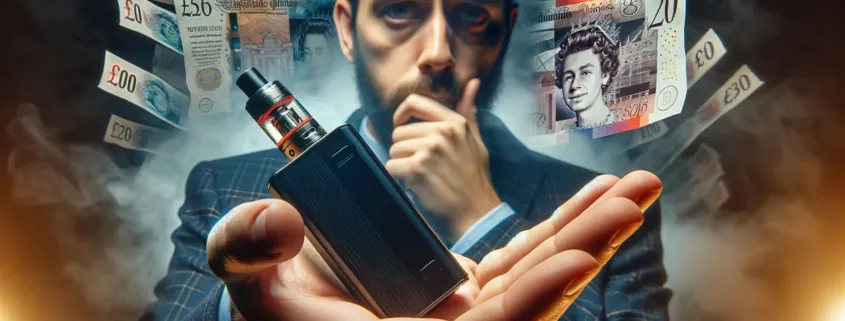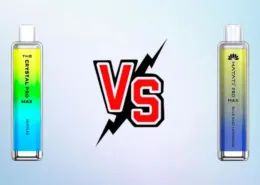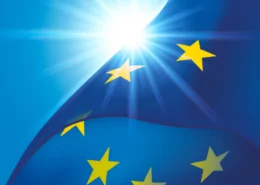UK Vape Tax: Implications for Vapers and the Industry
In a move that has been welcomed by the tobacco industry, UK Chancellor Jeremy Hunt has announced plans to introduce a ‘vape levy‘ starting from October 1, 2026. The proposed tax, which looks to be one of the most severe and complicated in the world, is set to at least double the cost of vaping for most users. In this article, we’ll examine the details of the planned tax, its potential impact on vapers and the industry, and what steps can be taken in response to this development.
Current Tax Rates and Proposed Changes
Currently, there is no specific tax rate on vape products in the UK, with vapes being taxed at the standard 20% VAT rate. However, under the new proposals, the tax will be based on the nicotine content in e-liquids, with zero-nicotine e-liquids also being subject to taxation. The tax tiers are as follows:
| Tier | Nicotine Strength | Tax (per 10ml E-Liquid) |
|---|---|---|
| 1 | 0% (0mg) nicotine | £1.00 |
| 2 | 0.1-1.09% (0.1-10.9mg) nicotine | £2.00 |
| 3 | 1.1-2% (11-20mg) | £3.00 |
It’s important to note that VAT will also be applied on top of the new tax, adding an extra 20% to the cost. This means that the average price of a 10ml bottle of e-liquid could increase from £3 to £6.60 for 18mg strength, £5.40 for 10mg strength, and £4.20 for 0mg strength. Shortfills and prefilled pods will also see significant price increases.
| E-Liquid Type | Current Price | Price After Tax |
|---|---|---|
| 10ml 18mg | £3.00 | £6.60 |
| 10ml 10mg | £3.00 | £5.40 |
| 10ml 0mg | £3.00 | £4.20 |
| 50ml shortfill | £10.00 | £22.00 |
| 100ml shortfill | £12.50 | £22.50 |
The results of these changes would make the UK one of the most expensive countries in the world for vaping, with only four other countries charging a higher tax for higher-strength e-liquids. The government states that the tax on cigarettes will increase by an extra £2 per hundred cigarettes and per 50 grams of tobacco to keep the price differential between vaping and smoking, equating to an extra 2p per cigarette.

Comparison with Smoking Costs
The government justifies the tax by comparing the number of puffs from a 10ml bottle of e-liquid to that from 100 cigarettes. However, this comparison fails to consider the vast difference in nicotine content between the two products. While 100 cigarettes contain between 1190 and 1450 mg of nicotine, the strongest e-liquid available contains only 200 mg of nicotine – less than one-fifth of that found in cigarettes.
Although vaping will still be cheaper than legal cigarettes after the tax, the price differential will decrease. Cigarettes are set to rise to an average price of £80 per £100, while seven bottles of e-liquid at the highest strength available will cost £46.20.
| Product | Price After Tax |
|---|---|
| 100 Cigarettes | £80.00 |
| 7 Bottles of 18mg E-Liquid | £46.20 |
Impact on Vape Businesses
Vape businesses will face significant challenges due to the proposed tax. The tax is paid when goods are imported or manufactured, not when they are sold, requiring a substantial investment from vape businesses to replace their stock. For example, a business with a stock level of 10,000 bottles of e-liquid would need to pay an additional £35,000 over their normal purchase cost to replace that stock, assuming an average tax of £3.50 per bottle.
Furthermore, premises that vape manufacture or hold e-liquid before tax is paid will need to be registered with and approved by the HMRC, with security information and other details supplied. The tobacco industry is also pushing for the implementation of a track and trace system, which could eliminate smaller manufacturers due to the associated costs and complexity. The UK government allowed five years for the implementation of track and trace for cigarettes and rolling tobacco, and ten years for other tobacco products, highlighting the complexity of such a system.
Potential Consequences of the Vape Tax
Smoking and Vaping Rates
The introduction of vaping taxes in other countries has led to an increase in smoking rates and a decrease in vaping. In Italy, a vape tax resulted in a 70% decrease in the number of vapers and an increase in the use of illegal and imported e-liquid. Research in the USA found that a $1 tax leads to a significant decrease in vaping rates and an increase in smoking rates, with a separate study showing that vape taxes also increase smoking in pregnant women by 6%.
The government hopes that keeping a differential between the price of cigarettes and vape products will deter people from reverting to smoking. However, research by Professor Notley found that many young people who smoke do so using illegal tobacco, and already find it cheaper than vaping.
It’s also worth noting that the vape tax will incentivize vapers to use lower nicotine strength e-liquids. When smokers try to switch using lower nicotine strengths, they are less likely to succeed, which may further reduce switching rates.

ECIGATOR
Ecigator is one of the well-known vape brands spun off from FM Technology Co., Ltd, it’s an ISO-certified disposable vape manufacturer for OEMs, ODMs, and OBM since 2010. The founder team comes from top firms with more than 10 years of experience in the vaping industry and has devoted thousands of hours to providing users with a better and better experience.
Black Market Sales
According to Trading Standards, the black market already accounts for one-third of vapes sold in the UK, with tests finding that these products are significantly more harmful than legal vapes. While there’s limited research on the effect of specific vape taxes on the black market, restrictions in Australia, where vapers are forced to have a prescription to vape, have led to an estimated 90%+ of vapers buying vapes illegally.
Effect on Competition
The complexity of dealing with regulations and the need to pay the tax before goods are sold is likely to lead to reduced competition in the market, particularly affecting smaller businesses. This could result in reduced choice and potentially further increased costs for consumers, similar to what has happened in the tobacco industry.
What Vapers Can Do
The government is holding a consultation for individuals, organizations, and businesses, and it’s crucial that vapers and supporters of tobacco harm reduction respond. Writing to MPs, explaining the potential unintended consequences of the proposed tax, can also make an impact.
Supporting organizations like the New Nicotine Alliance (for consumers) and the Independent British Vape Trade Association (for businesses) is key to having a chance of getting a more reasonable tax regime, whether with the current government or a new Labour government.
As Louise Ross, Chair of the New Nicotine Alliance, states:
“We urge all vapers and supporters of tobacco harm reduction to write to their MP, explaining briefly and respectfully how this proposed tax on vape liquids will have unintended consequences and will not help the cause of public health in any way. Also, please do share the NoVapeTax website with friends and let’s make an impact while we still can.”
Conclusion
The proposed UK vape tax has the potential to significantly impact vapers and the vaping industry, with the cost of vaping set to at least double for most users. The tax, which has been welcomed by the tobacco industry, could lead to an increase in smoking rates, a rise in black market sales, and reduced competition in the market.
Vapers and supporters of tobacco harm reduction must take action by responding to the government’s consultation, writing to their MPs, and supporting organizations like the New Nicotine Alliance and the Independent British Vape Trade Association. By doing so, there is a chance of achieving a more reasonable tax regime that does not undermine the public health benefits of vaping as a less harmful alternative to smoking.
- Minneapolis Sets $25 Minimum Price for E-Cigarettes - July 11, 2025
- Alabama Schools to Implement New Anti-Vaping Policies - July 11, 2025
- Is Vaping and Driving Illegal in Rhode Island? (2025 Guide) - July 10, 2025









